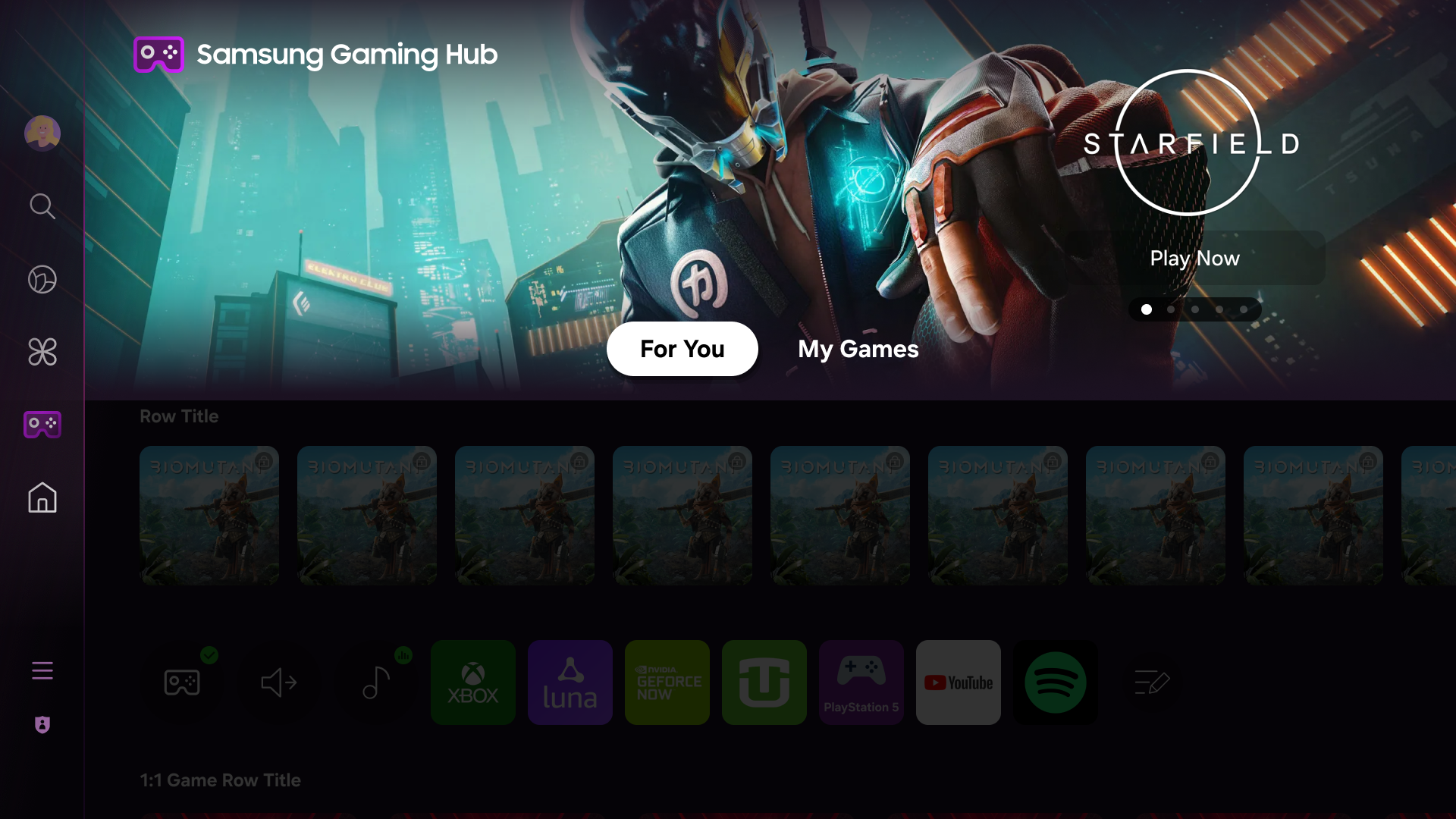
Bringing content forward to drive re-engagement
Samsung Gaming Hub: Masthead Redesign
Scroll ↓
Reimagining the Masthead for Discovery and Engagement
Samsung Gaming Hub is a game streaming platform built into Smart TVs. The masthead serves as the primary content surface, where games, campaigns, and promotions are featured. As Gaming Hub expanded beyond core gamers, we needed to rethink this space better to support discovery, engagement, and partner visibility.
The Opportunity
Earlier versions of the masthead were either too small or too generic—resulting in low CTR and limited discovery. We needed a content-forward, immersive experience purpose-built for Gaming Hub’s audience and goals.
My Role
As the Lead Design Strategist, I defined the UX direction for the masthead redesign—bridging user needs, partner goals, and system constraints.I partnered closely with PMs and visual/interaction designers, and guided alignment across marketing and engineering.
I was responsible for:
Defined UX strategy and design goals
Collaborated on wireframes and flows
Partnered with the marketing and content operations team on content placement logic
Helped validate direction through user testing
Shaped reusable surface system for future campaigns
Problem & Opportunity:
From low-impact ad to content-forward strategy
Initial UI at launch (2022-2023)
Launched with a small ad unit in top-left corner
Low visibility and weak performance
(CTR ~1.5%, -4% WoW)Early push for content-forward design didn’t succeed: → Low engagement → Discovery friction remained
2024
Adopted Media Home’s banner-style masthead
More visual space, but generic (Still low CTR)
Not purpose-built for Gaming Hub
2025
Broadened target beyond core gamers via Everyone is a Player(casual gamer) initiative
UX had to support more casual players with different needs and behaviors
Led to a dedicated Gaming Hub masthead, distinct from Home UX
Key User Needs
Research revealed clear needs across three main user groups of GamingHub.
Key Design Goals: Experience Beyond Aesthetics
Our challenge was to design a masthead that appealed to both core gamers and casual players—driving discovery and engagement while staying true to Gaming Hub’s value.
👀
Increase visibility
and awareness of relevant content
🚀
Improve CTR by prioritizing game discovery
🧩
Support both core
and casual player needs
🤝
Reflect the Gaming Hub brand and
partner value
💰
Maintain
monetization space
for promos and ads
Design Exploration: Exploring Scalable Surface Formats
Option 01: Ad Tile Row
One early direction was a row of mid-sized tiles. This approach allowed multiple ad or content units to sit side by side, making the masthead flexible and easy to scan.
Pros
Highly flexible: could support ads, curated content, or tutorials
Info-rich: larger size enabled metadata like logos, tags, and copy
Easy to scan: users could quickly parse multiple options
Cons
Visually flat: lacked hierarchy and emphasis compared to other formats
Risk of blending in with standard content rows rather than standing out
With these goals in mind, we explored different masthead formats to see how they could scale across both casual and core player needs. Our focus was on finding a surface that could drive visibility and engagement while remaining flexible for diverse content types.
Option 03: Immersive Ad Banner
The third direction pushed for a cinematic, full-width visual that could expand into full screen mode. This approach aimed to maximize impact with a striking, immersive presence.
Pros
Visually striking format with strong engagement potential
Full-width design created a more cinematic feel compared to other options
Cons
Relocated the “Recently Played” row, disrupting quick access for core gamers
Full screen view risked disorienting users by shifting the overall navigation context
Option 02: Ad Banner Row
Another direction was an oversized horizontal banner format that could also support video. This layout emphasized a single piece of content with stronger hierarchy and focus compared to a row of smaller tiles.
Pros
Clearer hierarchy and emphasis, making featured content stand out
Still flexible enough to support metadata such as logos, copy, and sponsored tags
Potential to support richer media like video for higher impact
Cons
Still carried the feel of a traditional ad, limiting its ability to feel native to Gaming Hub
Less immersive overall, risking disengagement from core gamers
Through user testing, we saw clear differences in how each format was received.
Users felt more drawn in by the immersive banner, often describing it as “more cinematic” and “more personalized”—even when the surface was technically promoting a partner title. Engagement was significantly higher compared to the horizontal banner format.
While fullscreen mode introduced some minor orientation friction, players overall said the layout felt like discovery rather than just being sold to.
This made the immersive approach not only more engaging, but also more aligned with the emotional tone we wanted the Gaming Hub to evoke.
Final Design
After evaluating different surface formats, we identified key trade-offs: flexibility vs. emphasis, visibility vs. immersion. These explorations informed the direction of our final masthead design—one that balances clarity, engagement, and scalability.
Outcomes: Early Signals from Testing
Since the immersive layout only launched in April 2025, we don’t yet have full performance data. But early user testing showed strong and consistent signals:
✨🙋♀️ User testing showed stronger engagement with immersive layout vs. banner format
💖📺 Users described the experience as “more personal” and “less like an ad”
🧩🕹️ The visual structure helped reinforce Gaming Hub’s role as a content platform, not just a wrapper for partner titles
These early results gave us confidence that the immersive direction not only engaged users but also aligned with the identity Gaming Hub needed to establish.
Confidentiality note:
Certain details of this project have been intentionally omitted for confidentiality reasons.
If you’d like to dive deeper into the UX strategy and results, feel free to reach out to thisisheej@gmail.com —I’d love to chat.







